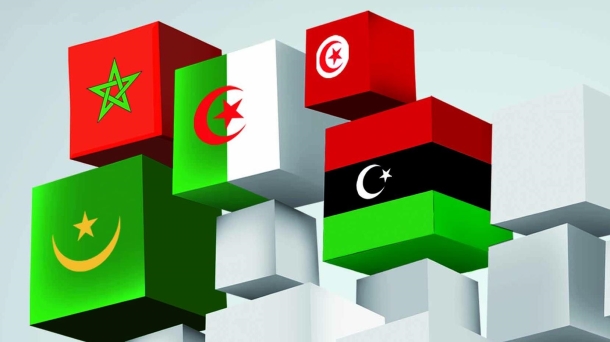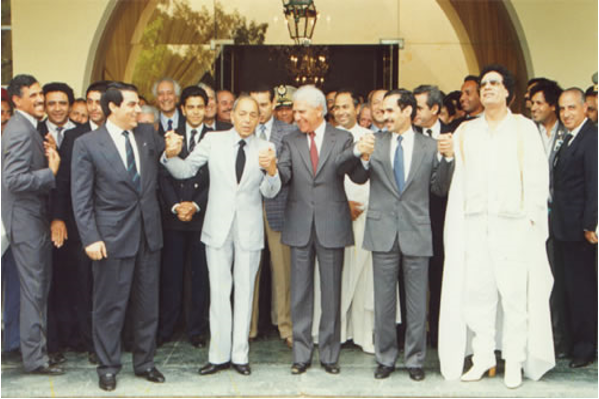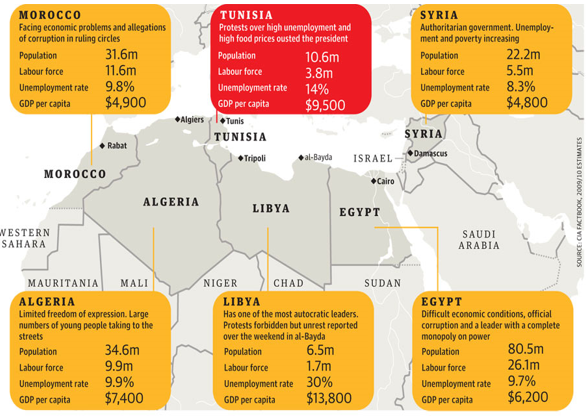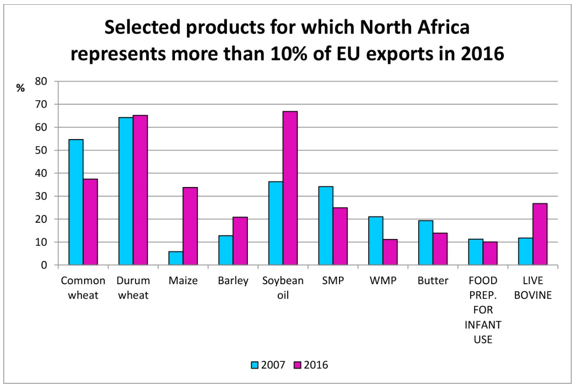
It has long been an axiom among the rulers of each Maghrebi country to brandish their rhetorical commitment to regional integration while often-shamelessly suffocating the principles and prospects of unity. King Mohammed VI of Morocco put an end to this masquerade in January 2017 when he proclaimed in front of African heads of state during the 28th African Union summit in Addis Ababa that the “The Arab Maghreb Union (AMU) is dead”. Ten months later in Abidjan, as if to bring his point home, the monarch took the occasion of the 5th African Union - European Union (AU-EU) summit to once again direct his rhetorical artillery at the AMU, that putrid carcass of an institution that “doesn’t exist”. For those that still cling or claim to care about the “Maghrebi dream” of integration, the instinct is to cry fatalism, for the throwing in the towel effect will extinguish any remaining glimmers of hope for unity that people of the Maghreb might still share. “We still believe in Maghreb integration for historical, cultural, political and economic reasons,” Algerian Foreign Minister Abdelkader Messahel stated in response to the comments made by Mohammed VI. (1)
The depressing truth, however, is that the King’s lament on the demise of the AMU is simply a reflection of the mood of resignation increasingly palpable in the Maghreb as well as rising frustration with the hypocrisy of those who preach the gospel of regional integration while doing nothing to bring it to fruition. Even Tunisia that as recently as 2012 its then president, Moncef Marzouki, tried hard to breathe into the Maghreb Union the spirit of unity rekindled in the early days of the Arab Spring, has switched gear, focusing on cementing its bilateral relations with its neighbors, and like Morocco, pursuing deep ties with growing African economies. So how did we get to this point of resignation? What's next for the Maghreb in the current hardened geo-political landscape that is increasingly riven by multiple and diverging interests? The two countries consequential enough to anchor the Maghreb remain at each other throats. Morocco and Algeria see eye-to-eye on almost nothing, and their bickering and recrimination has only gotten worse. Sadly, the demons of their discord seem to gradually possess their own public who intermittently hurl insults at each other in social media forums and sports and entertainment events.
Frozen in Time
Mohammed VI weariness with the depressing state of the AMU is not an aberration. After all, everyone knows that the AMU is an empty shell, ensnared in decades of neighborly parochial animosities, petty jealousies and perverse rivalries. The hypocrisy of Maghrebi leaders is well-established, and their citizens no longer know, or worse, care about what this institution is anymore. (2) The late Mohamed Boudiaf, a veteran of Algeria’s independence and the last president to genuinely wanted to establish good relations with Morocco where he spent decades in exile, foresaw this sad state of affairs as early as 1964 when he warned that by abetting nationalist passions, radical particularisms, and diplomatic intrigues, governments would end up engulfing the Maghreb in passionate rancor that it would be difficult to cram the genie back into the bottle. (3) Algerian novelist and journalist, Kamel Daoud, reiterated the same warning in March 2016 when he wrote that Morocco and Algeria are playing with fire. By stoking the fires of nationalism and populism, they are ‘fabricating, with the angry kids of today, the troops which will then make war on each other tomorrow.’ (4) Daoud’s cry of alarm might seem apocalyptic but is a reflection of growing concern within Maghrebi intellectual circles that the unrelenting enmity between Morocco and Algeria risks spiraling out of control.
At a time of increasing inflexible posturing, relentless insults and prickly sensitivities, potential sparks proliferate. The October 2017 disparaging remarks by Algeria's top diplomat, Abdelkader Messahel, when he accused Moroccan flagship businesses of laundering drug money in Africa are only one of the many examples where leaders’ irresponsible penchant for vilification deepens the discord between neighbors. (5) Of course, Algeria does not have exclusive monopoly for absurdity. In 2016, Hamid Chabat, the former Secretary General of the Istiqlal (Independence) Party, caused a diplomatic row with both Algeria and Mauritania by accusing the former of being a colonialist country that still “occupies Tindouf, Hassa Massoud and Bechar as well as other provinces which are at the origin, Moroccan” (6) and referring to the latter as “a Moroccan territory”. (7)
 |
| North African Leaders during the Maghreb Union summit, February 1, 1989 [Getty] |
Anecdotal evidence shows that this constant waves of rancor and vitriol has ended up trickling down to some parts of the public. (8) Even soccer games are becoming political affairs, as happened in May 2015 in Algeria when an African Champions League soccer game pitting Morocco’s Raja of Casablanca against Wifak Sétif descended into violence. Taking a dig at Moroccans, Wifak Sétif’s president, Hassan Hammar, proclaimed on camera that Algerians are proud supporters of the Polisario and possess a sense of dignity that Moroccans who kiss the hands of their King lack. (9) The Moroccan’s response came quickly when hackers penetrated the website of the Algerian Culture Ministry, leaving a warning message to the “Algerian people and its commanders” to steer clear of the territorial integrity of Morocco. (10) A year prior to the soccer incident, the callous remarks of an Algerian aspiring singer during an episode of Star Academy Arabia where she railed at the “sorcery” of her Moroccan counterpart who distributed traditional jewelry as a gift to other candidates caused an uproar on social media.
Such incidences, which are not limited to Morocco and Algeria, even if their occurrence between other Maghrebi countries are less vile and certainly less political, are driving an irreparable divide between the people of the Maghreb. At an age where the internet and social media are bringing people together, Maghrebi youths are not only becoming more disconnected from each other but also wholly unaware of the common history that once tied them. “Who of today’s youths remember the Tunisian brothers, Ali and Mohammed Bach Hamba, who, at the beginning of the twentieth-century, addressed a memorandum to US President Woodrow Wilson demanding the joint independence of Algeria and Tunisia?” Algerian journalist Akram Belkaïd rhetorically wondered. “Who among the young Maghrebi generations,” he added, “can articulate the role that the Arab Maghreb Liberation Committee chaired by the Moroccan Emir Abdelkrim El Khattabi played in the late 1940s? (11)
This growing disconnect bodes ill for Maghrebi integration. Aside from the dwindling forums where some of the region’s well-meaning intellectuals persist in discussing and debating the Maghreb Union, even if such intellectual exercises quickly lead to the same old arguments and points of criticism being rehashed over and over again, the Maghreb’s political parties, professional associations, civil society groups, and business interest groups have been conspicuous by their absence or indifference. (12) At the rare instances when such organizations try to breathe new life into the stalled integration process, their initiatives end up being too timid to create the powerful regional economic bloc necessary to put pressure on politicians to transcend their petty and self-serving disputes.
The creation of the Maghreb Union of Employers (UME) is case in point. In 2007, the Employers federations in the countries of the Maghreb—CAP (Algeria), LBC (Libya), UNPM (Mauritania), CGEM (Morocco), and UTICA (Tunisia)—created UME to try and reinvigorate business cooperation in the Maghreb. After all, the Maghrebi private sector has paid a steep price from disconnected national markets, low intra-regional trade complementarity, fragmented value chains, high tariffs and underdeveloped investment patterns. Unfortunately, the private sector, where the business entrepreneurs that matter most are deeply embedded in the regimes that sustain them, has been unable to provide the leadership role necessary to enhance regional integration.
 |
|
North African Statistics [Guardian] |
The Costs of the Non-Maghreb
The absence of regional integration has been costly to the Maghreb. (13) By some estimates, the region loses about 530 billion Dollars each year as a consequence of “trade restrictions and legislative barriers.” (14) The lack of trade complementarity, the mirroring similarities in the structures of trade and low export diversification have also had major negative impacts on intra-Maghrebi trade, which in 2015 accounted for only 3.6% of the region’s total trade and contributed a paltry 2.05% to the countries’ combined gross domestic product (GDP). (15) For example, the complementarity of Algerian and Libyan exports with the imports from other Maghreb countries is still very low. Morocco and Tunisia perform slightly better as they are more advanced in export diversification than their neighbors which rely heavily on products related to the hydro-carbon and mineral sector. Nonetheless, and despite their efforts at diversification, the range of goods exported by Morocco and Tunisia (textiles industry, agri-food, electrical and mechanical industries) remains quite similar. The low trade complementarity between the two has complicated their genuine efforts to trade more with each other.
The travails of the Agadir free trade regional agreement is revealing in this regard. Since the 2004 signing of the accord between Egypt, Jordan, Morocco and Tunisia, the latter two have resorted to more tariff protection and other restrictive nontariff measures against each other’s goods than did Egypt and Jordan in their own bilateral commercial trade. (16) This demonstrates how much their commercial policies are still shaped by competition rather than complementarity. Certainly, the mirroring of some of their economic profiles makes it easier to remain protectionist than to seriously tackle the sources of the uncompetitiveness of some of their manufacturing and redress the lack of complementarities of their exports and imports.
To be fair, while economic relations between Morocco and Tunisia remains below potential, the extent of their under-trading has declined. The Agadir agreement has helped facilitate trade and opened opportunities for investment even if the gains from such expansion remain small. When compared with the rest of the region though, this gradual improvement in commerce and trade casts the Moroccan and Tunisian experience in favorable light. The trade flows between Algeria, Libya and Mauritania are negligible. Their heavy reliance on natural resources and reluctance to engage in intra-industry trade make it very difficult to improve trade share between them even if they wanted to.
Algeria, Mauritania and Libya exhibit the least outward looking stance to regional commerce. Algeria’s trade with the rest of the region remains quite weak, with its exports and imports reaching only 25.5% and 11.6% of their potential. (17) By contrast, Morocco has improved its export potential to all Maghreb countries, except Algeria where the Kingdom’s exports have reached a mere 4.05% of their potential in 2015. Algeria’s exports to Morocco have not exceeded 13% of their potential. (18) Morocco doesn’t want to become dependent on Algerian hydrocarbon, sulphur and ammonia, three products the Kingdom needs to turn its abundant phosphate into fertilizers. (19) The pooling of the industrial assets of Morocco’s huge phosphate mining company (OCP) and the Algerian state-owned oil company Sonatrach could make the Maghreb a formidable powerhouse of fertilizer production, powering modern agriculture throughout the African continent and beyond while luring foreign investments and creating jobs desperately needed by the legions of unemployed educated youth in the region.
An example of this partnership is the $2.3 bln fertiliser joint-venture between Morocco (phosphate) and Gabon (gas) to create one ammonia production unit and one phosphate fertilizer in Gabon as well as two phosphoric acid production units and one phosphate fertilizer in Morocco. (20) OCP estimates that this industrial project has the potential to cover more than 30% of the continent’s total demand for adequate and affordable fertilizers. Morocco is also helping boost fertilizer production in Nigeria as well as exploring and upgrading phosphates reserves in the country. The Group Managing Director (GMD) of the Nigerian National Petroleum Corporation (NNPC), Dr. Maikanti Kacalla Baru, noted that the supply of Moroccan phosphate to Nigeria is breathing new life into agriculture by making fertilizers available and affordable. “”This development has translated to the creation of about 50, 000 jobs and led to the production of about 1.3 million tons of fertiliser in the country,” Baru stated. (21)
 |
| North African Export to EU [The European Commission] |
Unfortunately for the people of the Maghreb, the self-damaging and self-defeating rivalry between Algeria and Morocco has prevented the creation of similar thriving partnerships. There seems to be little or no limit to these disruptive absurdities. In the first two months of 2018, Algeria imported “some 8,036 “semi-assembled” vehicles from the Dacia plant in Romania” while such product is readily assembled in Tangier. (22)The same applies to agricultural commodities that Algeria massively imports from outside of the Maghreb while much of it is produced by its neighbor to the west. (23)
And then there is question of the closed border. While the African Union is frantically working towards the creation of a continental free trade area—a "glorious challenge, says African Union commission head Moussa Faki Mahamat, “which calls for the courage to believe, the courage to dare... the courage to achieve," Morocco and Algeria are reinforcing the fences around their border. “It is crazy that goods need to transit between these neighbors via the French port of Marseilles when they could simply cross over by land,” wrote Wadia Ait Hamza, head of Social Engagement at the World Economic Forum. (24) Morocco regularly clamors for opening the border, doing so “sometimes in a vehement or clumsy way,” writes Akram Belkaid. (25) Algeria claims that it wants the border open too, but as President Bouteflika once acknowledged, doing so would be benefit Morocco more than it does Algeria. It does not matter that border barriers make both countries poorer, as long as one’s rival losses exceeds one’s own. (26)The economic toll of this ludicrousness has been prohibitively costly. “Over the decade to 2015,” writes the Economist magazine, “their two economies would each have almost have doubled in size.” Instead, Algeria’s economy expanded “only by 33% and Morocco by 37%,” (27) insufficient growth to tackle the stubbornly high number of unemployment in their countries.
Few Glimmers of Hope
The initiative behind the creation of the UME promised to be an important pathway towards laying the groundwork for moving the region towards better levels of intra-regional business cooperation. If as initially envisioned, the major business associations could bundle their forces, they may be able to transform the landscape of trade in the Maghreb. Most importantly, they could collectively lobby more effectively their governments for the harmonization of regulation and liberalization of markets, i.e, the adoption of a Maghrebi dimension into national agendas and policies. Indeed, the launching of the Maghreb Initiative for Commerce and Investment (IMCI) and the Arab Maghreb Union Investment Bank (BMICE) in 2014 were rooted in the desire to develop the framework and networks necessary to start the process of dismantling barriers to the growth of intra-regional commerce and industry and connecting Maghrebi markets together. BMICE, for example, was designed as a first concrete step towards growing Maghreb financial integration and investment linkages. So far, intra-regional FDI represent less than 1 percent of total FDI. This paltry level has not improved over the past three decades, with the cumulative FDI flows between 1985 and 2014 amounting to $ 476.7 million, a derisory number when compared with the region's share of global FDI flows ($ 111.8 billion during the same period). (28) By way of comparison, Morocco’s investments in Africa exceeds that amount. Indeed, according to African Development Bank president Akinwumi Adesina, 85% of Morocco’s direct foreign investments goes to Africa, (29) making the kingdom the second largest investor and the third largest exporter in Africa.
The official launch of the BMICE in December 2015 with an initial capital of 150 million US dollars is certainly a step in the right direction. Overtime, the BMICE, headquartered in Tunisia, hopes to improve the flow of capital and goods between Maghreb countries as well as boost investments in telecommunications, electricity, transport, and infrastructure. Cross-border infrastructure (roads, ports, and other relevant transport services) between countries is poor. Their maritime connectivity is even worse. Apart from Morocco, Maghrebi ports suffer from “lack of investments in modern infrastructure, land-use problems within large cities, limited hinterland accessibility, poor technical efficiency and cumbersome customs regulations.” For Tunisia, the lack of maritime trade between the countries of the Maghreb had forced it to abandon the ambitious project of large deepwater port that the deposed Ben Ali once considered constructing. (30) Algeria, on the other hand, has recently started focusing on modernizing its port infrastructure (31) which for the longest time had “the lowest logistical performance index among Maghreb countries.” (32) The country hopes to emulate the success of the Moroccan Tanger Med project, soon to be the busiest port on the Mediterranean, by building a new $3.3bn port and industrial zones at El Hamdania. (33) This is a worthy investment even if observers of the Maghreb doubt that these projects will facilitate maritime connectivity between Maghrebi countries. After all, the Algerian project is designed to compete with not complement Moroccan ports.
The challenge for Algeria, and indeed, all Maghrebi countries is to diversify their economies in a way that develops their complementary sectors and overcome the shortcomings of their competing ones. Identifying the synergies between all countries of the Maghreb and deepening their sector specialization and productivity in their base of manufacturing, services and other industrial spaces is essential to increasing intra-regional trade and ameliorating the performance of national economies.
Conclusion: The Lingering Hope
The dream of Maghrebi integration remains as elusive as ever. It is hard to disagree with those who proclaim that the AMU is just about dead. To be fair, the project has never really been alive even if the five countries of the Maghreb recognize the tantalizing benefits of greater economic, financial and commercial cooperation. The 800-pound gorilla problem is the contentious rivalry between Algeria and Morocco that the passage of time has only made worse. The pragmatic impulses that led the two countries to create the AMU seem to have faded away. In the mid-1980s, President Chadli Bendjedid (1979-1992) and King Hassan II (1961-1999) accepted a Saudi diplomatic initiative to meet, negotiate and de-escalate their rising tensions. That’s how they came up with the smart idea of not making the resolution of the Western Sahara dispute a prerequisite for regional integration. The bet was that gradual economic rapprochement would end up resolving the dispute as well as relieving the mounting economic problems that threatened their internal stability. (34)
Today, unfortunately, promising initiatives like the one that led to the construction of the Maghreb–Europe Gas Pipeline, linking the Hassi R'Mel gas field in Algeria to the Strait of Gibraltar and the Iberian Peninsula through Morocco, are a thing of the past. Equally frustrating is the lack of any serious international diplomatic initiative to help the Maghreb unlock its potential. There was hope that the tectonic events of the 2011 Arab revolts would bring the region to its senses. After all, it was fear of domestic turbulence that brought Algeria and Morocco in the mid-1980’s to meet and compromise.
Until better times, countries of the Maghreb seem to have given up on the dream of regional integration. Morocco in particular is aggressively seeking new markets in Africa and coveting membership in the Economic Community of West African States (ECOWAS). [Video]
(1) "Algeria accuses Morocco of preventing Maghreb Union growth," Middle East Monitor, February 21, 2018, https://www.middleeastmonitor.com/20180221-algeria-accuses-morocco-of-preventing-maghreb-union-growth/
(2) Akram Belkaïd, "Le Maghreb toujours en panne," Huffpost Maghreb, July 1, 2013, https://www.huffpostmaghreb.com/akram-belkaid/le-maghreb-toujours-en-pa_b_3527649.html
(3) François Soudan, "Algérie – Maroc : une relation désespérément bornée," Jeune Afrique, September 8, 2014, http://www.jeuneafrique.com/45354/politique/alg-rie-maroc-une-relation-d-sesp-r-ment-born-e/
(4) Réda Mouhsine, "Maroc-Algérie : Le cri d’alarme de Kamel Daoud," Tel Quel, March 31, 2016, https://telquel.ma/2016/03/31/maroc-algerie-cri-dalarme-kamel-daoud_1489999
(5) "Indignation au Maroc après les propos d’un ministre algérien sur « l’argent du haschich »," Le Monde, October 23, 2017, http://www.lemonde.fr/afrique/article/2017/10/23/indignation-au-maroc-apres-les-propos-d-un-ministre-algerien-sur-l-argent-du-haschich_5204659_3212.html
(6) Wadii Charrad, "Chabat : «L'Algérie est un pays colonialiste»", Tel Quel, February 17, 2016, http://telquel.ma/2016/02/17/chabat-lalgerie-pays-colonialiste_1483127
(7) "Morocco’s Istiqlal Party in disarray over leader’s Mauritania statement," Middle East Online, December 30, 2016, https://www.middle-east-online.com/en/node/675548
(8) Raphaël Lefèvre (2016), Morocco, Algeria and the Maghreb’s cold war, The Journal of North African Studies, 21:5, 735-740.
(9) "We Are from the Polisario and Support Them: President of Algerian Soccer Team" Morocco World News, May 7, 2015, https://www.moroccoworldnews.com/2015/05/157926/we-are-from-the-polisario-and-support-them-president-of-algerian-soccer-team/
(10) https://www.huffpostmaghreb.com/2015/05/03/hackers-maroc-algerie_n_7198996.html?utm_hp_ref=mg-hackers
(11) Akram Belkaïd, “Le Maghreb toujours en panne,” Huffington Post Maghreb, August 31, 2013.
(13) Lamrani, El Mehdi. 2013. “L'Union du Maghreb ou l'invincible espoir.” L'Année du Maghreb, 9: 263–76
(14) Konsentio, Making the Case for Maghreb Business in Times of Change, (2013), https://di.dk/SiteCollectionDocuments/DIBD/AE-Network/Network%20Meetings%202014/Konsentio_IMCI_Draft%20report.pdf
(15) Azam Mahjoub, et.al, «Intégration régionale: quelles alternatives populaires pour une intégration effective et durable du Maghreb?” Forum tunisien pour les droits économiques et sociaux (FTDES), November 2017, http://ftdes.net/rapports/resume.coutdunonmaghreb.pdf
(19) Francis Ghilès, "Que peuvent-faire l'Europe et la France au Maghreb?" Presentation at Fondation Res Publica, February 17, 2014, https://www.fondation-res-publica.org/Que-peuvent-faire-l-Europe-et-la-France-au-Maghreb_a800.html
(20) "A South-South partnership project between Morocco and Gabon," http://www.ocpgroup.ma/media/corporate-news/south-south-partnership-project-between-morocco-and-gabon
(21) “Nigeria, Morocco deal to boost fertiliser production by 1.3m tonnes,” The Guardian, March 28, 2017, https://guardian.ng/business-services/nigeria-morocco-deal-to-boost-fertiliser-production-by-1-3m-tonnes/
(22) Hana Saada, "Renault Algeria: 8,000 semi-assembled vehicles imported from Romania in 2 months," DZ Breaking, March 23, 2018, https://www.dzbreaking.com/2018/03/23/renault-algeria-8000-semi-assembled-vehicles-imported-romania-2-months/
(23) Marwane Ben Yahmed, “Algérie – Maroc: « It’s the economy, stupid*! »” Jeune Afrique, 6 November 2017.
(24) Wadia Ait Hamza, "The Maghreb Union is one of the world's worst-performing trading blocs. Here are five ways to change that," World Economic Forum,Hune 1, 2017, https://www.weforum.org/agenda/2017/06/five-ways-to-make-maghreb-work/
(25) Akram Belkaïd, “Le non-Maghreb et son coût,” Huffingtonpost Maghreb, December 16, 2017, https://www.huffpostmaghreb.com/akram-belkaid/le-non-maghreb-et-son-cout_b_18841118.html
(26) Anouar Boukhars, “The Maghreb’s Fragile Edges,” Africa Security Brief, No. 34, March 2018
(27) “Morocco and Algeria keep building more Barriers,” The Economist, July 27, 2017, https://www.economist.com/middle-east-and-africa/2017/07/27/morocco-and-algeria-keep-building-more-barriers
(28) Azam Mahjoub, et.al, «Intégration régionale: quelles alternatives populaires pour une intégration effective et durable du Maghreb?”
(29) "Morocco in Line with AfDB's High 5s," All Africa, July 22, 2016, http://allafrica.com/stories/201607221044.html
(30) Thibaud Teillard, "En Tunisie, de grandes ambitions à l’abandon," Jeune Afrique, December 7, 2017, http://www.jeuneafrique.com/mag/496436/economie/en-tunisie-de-grandes-ambitions-a-labandon/
(31) Thibaud Teillard, "Transport maritime : avec Tanger Med, le Maroc lance la course à la taille au Maghreb," Jeune Afrique, December 7, 2017, http://www.jeuneafrique.com/mag/496483/economie/transport-maritime-avec-tanger-med-le-maroc-se-lance-dans-la-course-a-la-taille/
(32) Fatima Mohamed-Chérif, César Ducruet. Regional integration and maritime connectivity across the Maghreb seaport system. Journal of Transport Geography, Elsevier, 2016, 51, pp.280-293, https://halshs.archives-ouvertes.fr/halshs-01145664/document
(33) "Algeria Plans $3.3 Billion Port Project," Port Technology, February 7, 2017, https://www.porttechnology.org/news/algeria_plans_3.3_billion_port_project
(34) Francis Ghilès, "Que peuvent-faire l'Europe et la France au Maghreb?" Presentation at Fondation Res Publica, February 17, 2014.